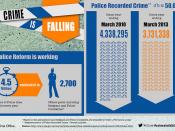Juveniles Must Accept Responsibility for Their Crimes Are juveniles as under control today as they were in the past? Crime plays a major role in today's society. The government follows a policy and has always followed the policy that no crime goes unpunished. The controversy that surrounds the United States courtrooms today, is whether or not a minor needs to stand trial as an adult for committing a serious offense. These decisions made by the judge or jury in the preliminary hearing affect the rest of the juvenile's life. The opposing argument to the issue of juveniles being tried as adults' remains that the minor is too young and immature to understand the consequences of what he or she did wrong. No matter what the crime may be, juveniles must be punished, and if deserved, they should be tried as adults.
Background: In the nineteenth century, when the juvenile justice system was first started, it reflected the view that children are more innocent, less guilty of criminal motives, and are more in need of protection and discipline than that of adults.
As it has been for many years, since the late 1800's, the juvenile court system was designed to take child offenders out of the criminal courts and protect them from criminal procedures and its effects. The courts are designed to punish and/or cater to the violations that the child has not followed, or has broken (Rubin 46). The courts also try to teach minors that living a life of delinquency and being involved in crimes of various natures may not only bring the child to be involved in more serious crimes, but may also bring the child to be incarcerated to the maximum penalty for his or her crimes (Rubin 46).
Although the factors that account for these earlier...



Good paper
The pape is excellent, well-structured. However, the writer has used sources but not referenced them in bibliography.
0 out of 0 people found this comment useful.